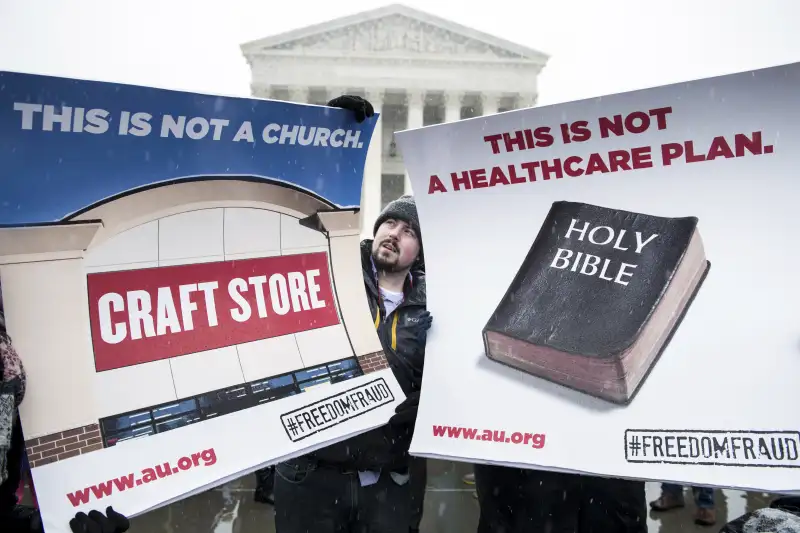What the Supreme Court Birth Control Ruling Means to You

This morning the nation’s highest court weighed in on a topic usually reserved for the doctor’s office or bedroom. In a 5-4 vote, the court ruled that the Affordable Care Act cannot require closely held, for-profit corporations to provide health insurance that covers contraception services for women when those services go against their religious beliefs. The anxiously awaited decision could have far-ranging implications for religious freedom and health reform.
Women and their partners, though, are likely wondering what the decision means for the cost of birth control. Here's what you need to know.
What is the health insurance benefit at the center of this fight?
Starting last year, you no longer had to fork over any cash to buy contraception (aside from the premium you paid). Under Obamacare, most insurance plans, both individual and group policies, must fully cover preventive services designed to keep you healthy, such as mammograms, colonoscopies, and many vaccinations. After the Affordable Care Act was passed, the Institute of Medicine recommended that contraception be included on that list of no-cost services, says Judy Waxman, the vice president for health and reproductive rights at the National Women’s Law Center.
That has meant that most health plans must cover the full range of contraceptives approved by the Food and Drug Administration, including pills, rings, patches, shots, implants, intrauterine devices, barrier methods, and sterilization procedures. For each of these services, as long as you have a prescription from the doctor, you’ll pay nothing.
There are a few nuances. For example, if a drug comes in a generic version and you opt for the brand name, you may owe a co-pay or co-insurance (although there is a waiver process that grants you access to the premium drug at no cost if your doctor asserts you need it for a medical reason).
Previously, large group plans typically covered contraception but you had to cover a co-pay or co-insurance, according to David Dross, who runs the pharmacy practice at benefits consultant Mercer. You also owed your deductible before the coverage kicked in. So you may have paid the full cost for, say, ten months.
On Friday the Department of Health and Human Services announced that an additional 24.4 million prescriptions for oral contraceptives were given out with no co-pays in 2013 compared to 2012.
So what was the legal battle over?
In this case two for-profit companies, the big box craft chain store Hobby Lobby and cabinet maker Conestoga Wood, argued that they view certain types of contraception, such as morning after-pills Plan B and ella, akin to abortion and in violation of their Christian religious beliefs. They asked to be exempt from paying for those services.
Will the ruling change my insurance coverage?
If you work for a large, publicly traded company, the decision will likely not change what your birth control costs, says Waxman. The ruling specifies that only “closely held” firms, or those owned by a small number of individuals, with sincerely held religious beliefs can qualify for an exemption. So you’re unlikely to see a Fortune 500 company strip these services from their health plans any time soon.
While it's unclear how many firms could potentially qualify for the exemption, workers at any firms that do won't necessarily be left paying for their pills. “The administration will likely by regulation put some type of work-around in place," to give workers the benefit, says Tim Jost, a law professor and Affordable Care Act expert at Washington and Lee University. “I just don’t know how long it will take them to do it. They may be prepared to do it very quickly.”
What if I work at a non-profit with a religious affiliation, such as a Catholic hospital or university?
Religious organizations such as churches were already exempt from the requirement that they cover all types of FDA-approved contraception. Separately, religious-affiliated non-profits, including universities and hospitals, were granted a workaround by the Obama administration. Workers in those firms still have access to contraception at no cost. The companies simply turn over the administration and cost to the health insurer. There are legal suits working their way through the court system fighting this accommodation, though. Based on today’s ruling, Jost says it seems that the court may be implicitly saying this work-around is permissible.
